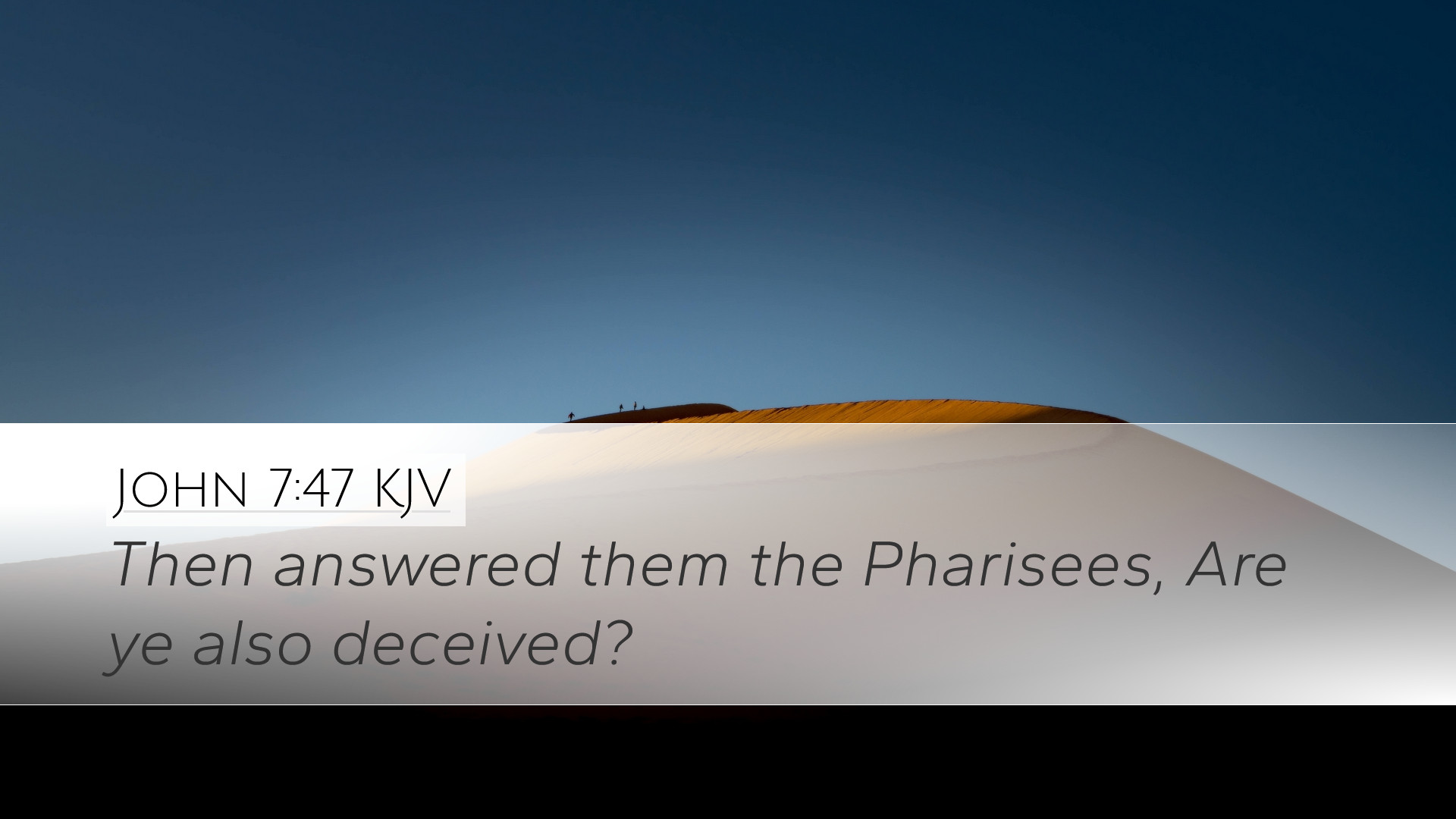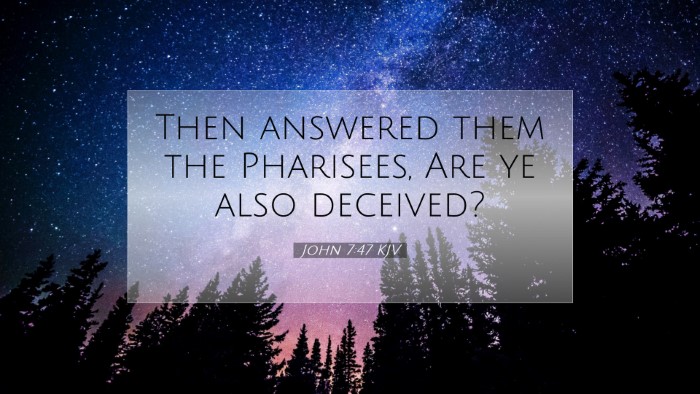Commentary on John 7:47
Verse: "Then answered them the Pharisees, Are ye also deceived?" (John 7:47)
Introduction
The context of this verse is crucial for understanding the significance of the Pharisees' response. This passage occurs during the Feast of Tabernacles when Jesus boldly teaches in the temple, generating mixed reactions among the people, the authorities, and the religious leaders. The verse reflects the tension between Jesus' authority and the skepticism of the religious leaders.
Insights from Public Domain Commentaries
Matthew Henry's Commentary
Matthew Henry emphasizes the confusion and disarray within the Pharisaical ranks. The Pharisees, despite being the religious leaders, find themselves questioning the validity of their own positions when confronted by the people's admiration of Jesus. Henry posits that the phrase "Are ye also deceived?" indicates a challenge to the officers who had been sent to arrest Jesus but were persuaded by His words instead. This reveals the inner conflict and the desperation of the Pharisees, who relied on their perceived authority yet were losing control over the crowd.
Albert Barnes' Notes
Albert Barnes delves into the nature of the Pharisees’ leadership crisis at this moment. He asserts that the Pharisees had not only been unsuccessful in their attempt to discredit Jesus but were also threatened by the allegiance that the populace showed toward Him. Their question "Are ye also deceived?" reflects a defensive posture that indicates their growing paranoia about losing influence. Barnes also highlights the irony that these leaders, who prided themselves on knowledge and discernment, were themselves blind to the truth of Jesus’ identity and mission.
Adam Clarke's Commentary
Adam Clarke provides a historical perspective highlighting the arrogance and spiritual blindness of the Pharisees. He notes how their question implies not only disbelief but also an attempt to delegitimize any support for Jesus among the masses. Clarke suggests that this illustrates the common reaction of those in power when faced with a challenge; they often resort to intimidation or disparagement rather than engaging with valid points made by those they wish to suppress. The Pharisees, in their zeal to protect their authority, fail to recognize the fulfillment of prophecy in Christ, showcasing a tragic misunderstanding of their own Scriptures.
Theological Implications
This passage invites reflection on the nature of authority and the challenges posed to established religious systems by divine truth. The Pharisees' question reveals their fear of losing authority, serving as a reminder for contemporary religious leaders to prioritize spiritual truth over institutional security.
- Authority vs. Truth: The dynamic between ecclesiastical authority and the transformative power of truth is central to this discourse. The Pharisees place their traditions above the truth embodied in Christ.
- Spiritual Blindness: This scenario illustrates how spiritual leaders can become blinded by their own biases, failing to see the unfolding revelation of God right in front of them.
- Response to Jesus: The officers’ reaction demonstrates an essential truth about spiritual awakening; it often comes from unexpected places and challenges societal expectations.
Practical Applications
For pastors, students, theologians, and Bible scholars, this passage calls for introspection regarding the handling of authority and the pursuit of truth. Here are some practical applications:
- Encourage Open Discussions: Religious leaders must encourage dialogues that allow for questioning and seeking truth, rather than stifling dissent.
- Examine Personal Bias: Pastors and leaders should regularly examine their biases and seek genuine understanding of Scripture in the light of Christ.
- Focus on Jesus: Emphasizing Christ’s teachings and actions over traditional authority can lead to reinvigorated faith communities.
Conclusion
John 7:47 serves as a poignant reminder of the challenges faced by Jesus during His ministry. The Pharisees’ inquiry is not merely a moment of confusion; it encapsulates the struggle between human authority and divine truth. This commentary highlights the necessity for all who engage with Scripture to remain vigilant against the spiritual blindness that can accompany authority, always striving to embrace and communicate the truths revealed by Christ.


